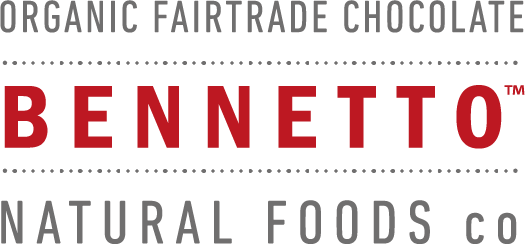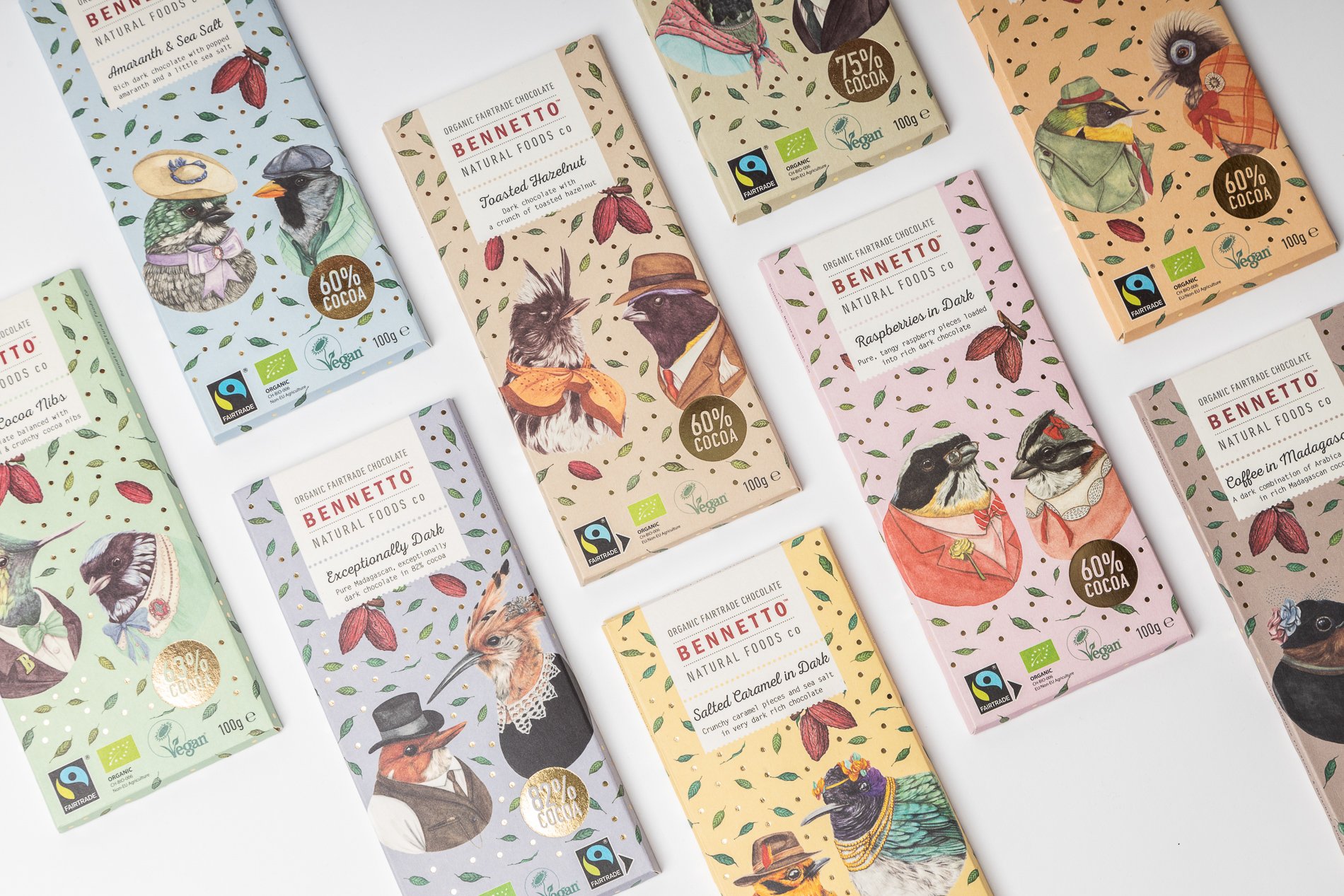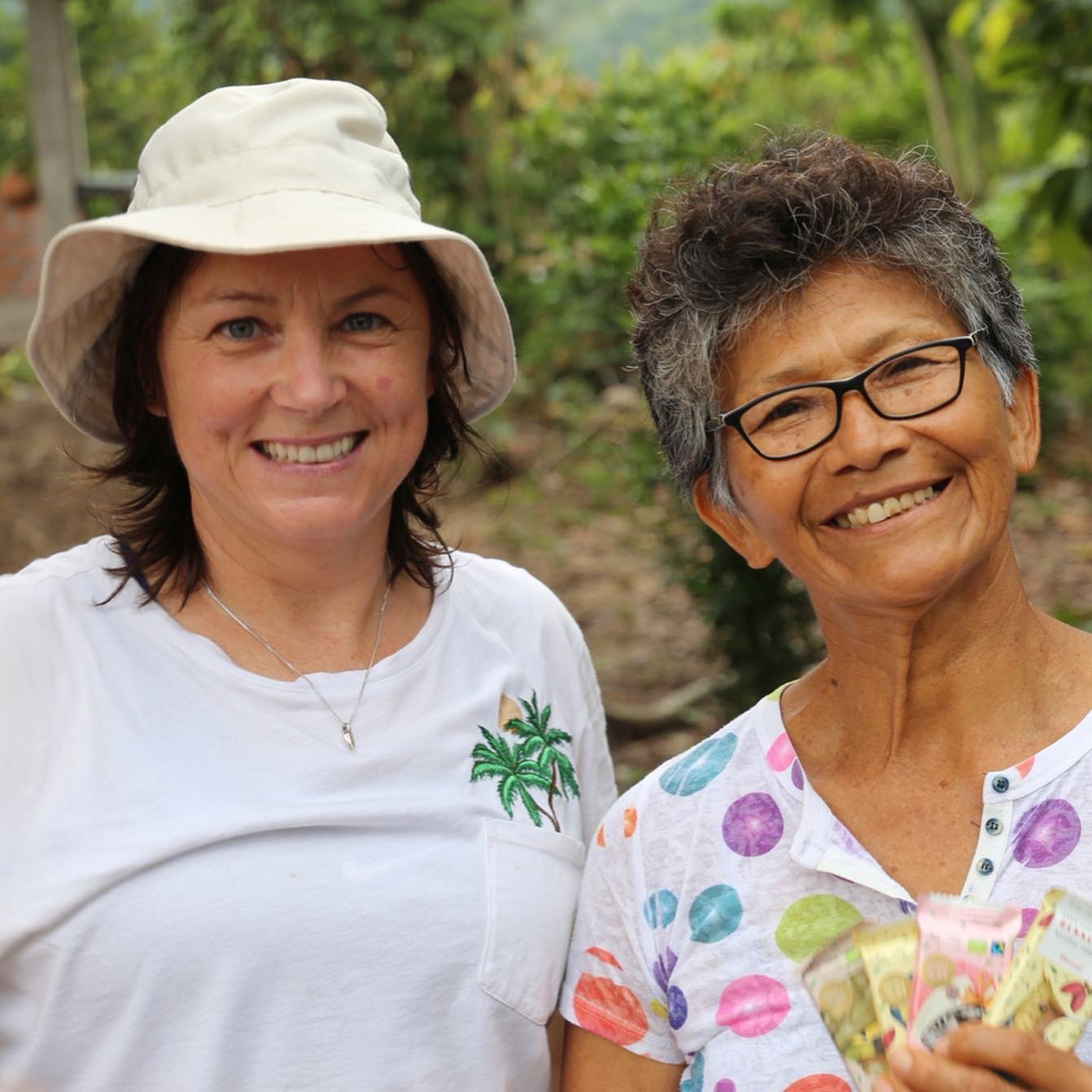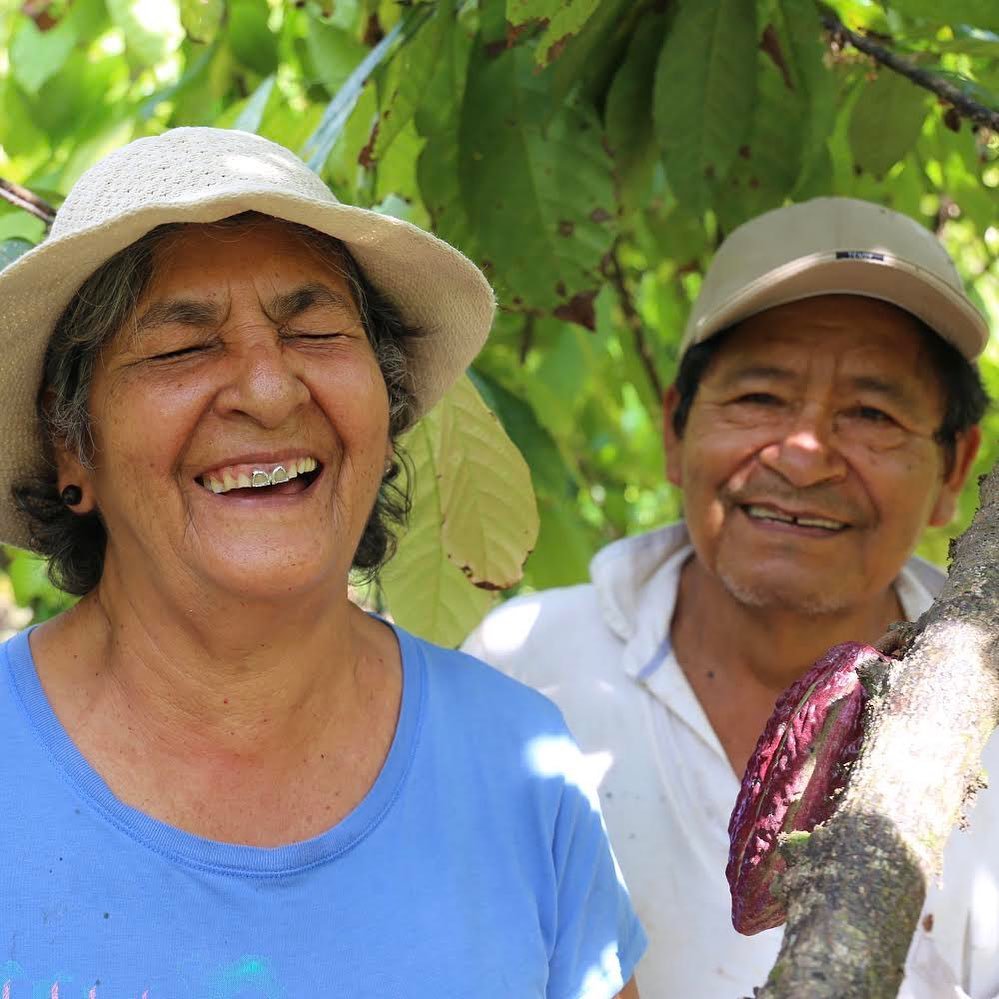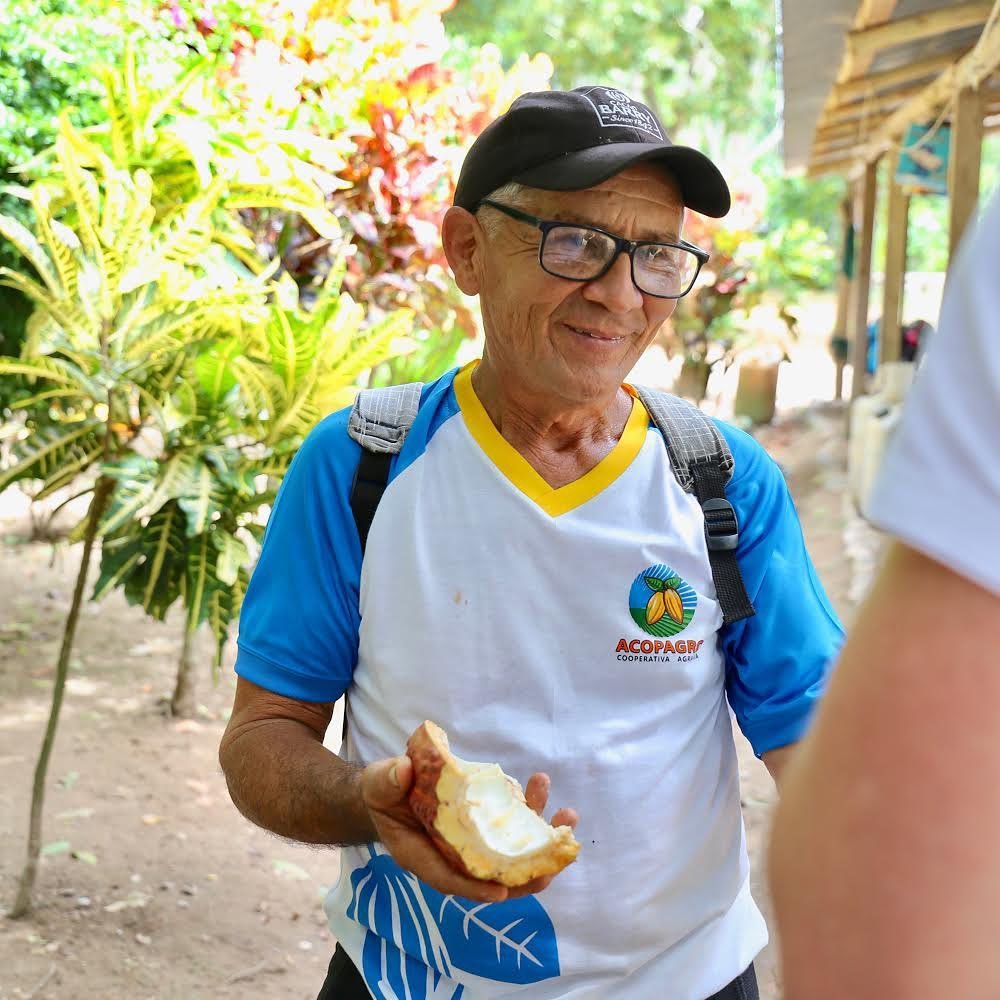Lucy recently gave an interview to our partners at fair&good, explaining the reason behind everything we do at Bennetto. Read more below
original source: fair&good interview
As good as their products taste, Bennetto Natural Foods has always aimed to do more than simply produce great chocolate. Image credits: Bennetto Natural Foods
Who doesn't love a good chocolate bar? It's a universal delight, a small luxury that brings a smile to faces around the globe. But behind every decadent bite, there's a story, often untold, of how it came to be.
Meet Bennetto Natural Foods, an ethical chocolate brand that's not just satisfying our chocolate cravings but is also deeply rooted in a mission to make the world a little sweeter, in every sense of the word.
What began as a kitchen experiment has now grown into an international venture as Bennetto launched their UK store on Amazon.co.uk last November. They also attained a B Corp certification, in addition to sourcing Fairtrade ingredients
Sitting down with Lucy Bennetto, we had a chat about the complexities of ethical sourcing, their commitment to sustainability and why doing things the right way matters.
What sparked the idea to start Bennetto, and how has your vision transformed over the years?
It began as creating a potentially healthier alternative for myself because I’ve always loved chocolate, but I do suffer from migraine headaches if I eat foods with too much sugar and chemicals. And when I was in the UK working in 2010, I came to realise that chocolate or cocoa itself is really high in antioxidants but it’s what we add to it, the sugars, the milks, the preservatives, that makes it bad for you.
So I set about making my own. I ordered some cocoa powder then I used coconut oil and combined it with honey or something ridiculous, and of course it was a version of chocolate but it was probably never going to last.
When I went back to New Zealand, I started experimenting again, and then eventually I got a grant from Tech NZ to develop some chocolate recipes that were healthier, had no additives and were made from clean ingredients. I tested alternative sugars like agave and coconut sugar, but eventually decided that the best option would be cane sugar, but a less processed version. Other sugars have issues with manufacturing and would only ever be something I could do on a small scale. And even though at the time, I was producing on a small scale, I was thinking ahead about what if I could produce what I’m making on a larger scale for further impact.
Lucy started Bennetto Natural Foods as a healthy chocolate alternative for herself. Today, Bennetto is a global brand, expanding quickly in the UK market. Image credits: Bennetto Natural Foods
Interesting - so did you ever intend for these experiments to eventually become a business or did that evolve naturally?
It's funny, I guess it was the first seedling. I was a school teacher at the time but I always wanted to do something else with impact. I didn’t know what it was - I knew what it would feel like but I didn’t know what it would look like. And that feeling was always just parked but it was always at the back of my mind and it sort of just happened organically.
I was not at all prepared for the amount of work that was involved and I’m glad I wasn’t! If I had any idea, or could see into the future the challenges involved, I would have just gone, “There’s no way I’d be capable of that!”
Expanding into the UK market is a significant step. How do you balance the demands of scaling up while staying true to your values?
Yeah, so it is very difficult because with each of those values comes at a cost because there’s absolutely no compromise. We pay more for our cocoa, our production costs are higher because we don’t use preservatives, we certify all our ingredients. We also pay a premium to Fairtrade on every bar sold. So really the only thing we’re cutting down on is efficiency.
We've still got the same quality of ingredients, but we’re able to keep that integrity the whole way through.
The aim is to build the market so we can ensure the price of ethical chocolate is affordable. Our intention is never to make this an elitist product or something that’s out of reach. We want everyone to have access to good organic, Fairtrade chocolate made with clean ingredients.
We’re not a big corporation and we probably never will be. We try to keep the decision-making process very very simple so we're not having to jump hoops for the sake of a bigger margin and I think that's the advantage Bennetto has. I don’t have to go through heaps of people who are only concerned about the bottom line to get our decisions approved.
How did the journey to source Fairtrade ingredients begin?
I always knew that I wanted to use Fairtrade ingredients because there was so much exploitation in the cocoa industry. But I didn’t know much about the Fairtrade system.
I really wanted to understand the organisation and make sure that they were doing what they say they’re doing.
So during the school holidays, I visited the Dominican Republic and got in touch with a cooperative there. I stayed with some local people and met farmers and just learned about how Fairtrade helps them. I discovered that it was about supporting the producers at a community level and having the confidence that the cocoa is also grown in a way that works with nature and not against it.
Since then, I’ve visited a couple of other farms in Peru. When I asked them what they spend their premiums on, one farmer said that all the children in that cooperative get glasses. Other cooperatives choose to build a kindergarten or a community hall or buy additional tools for the cooperative. Some put the money towards education scholarships for the children to attend agriculture universities. They just seem really happy to be part of this collective and vote on decisions together.
One of the good things about that is education on developing better crops on post-harvesting techniques - they even have field officers that tour the cooperatives and train farmers all-year round.
I've really enjoyed being part of the Fairtrade organisation. It’s a pretty robust system where they thoroughly audit and double check these collectives and if they’re not meeting the standards they get delisted. I know it’s not the only one, but it's the one that works the best for us for the most impact.
Bennetto’s chocolates are certified Fairtrade, organic, gluten-free and vegan. Image credits: Bennetto Natural Foods
What’s the most surprising lesson you’ve learned about running an ethical business?
People will never purchase on ethics alone. It has to pass the taste test.
I think the taste, the texture and what the brand culture is probably one of the most important factors. It needs to satisfy the customers, especially in terms of taste. And that can be hard if as I say, it is always challenging, when there's so much that you don't add. I mean, we don't add milk, which adds flavour. We don't pile on with sugar, that adds flavour too. We don't add artificial flavouring. So we just try and make sure that we are good on price and that we taste good and we are good as well.
So, what's on the horizon for 2024?
Currently, we're looking at our new 80gm chocolate bars reaching more markets in the UK and Europe. We also plan to bring out the perfect mini easter egg, which will be soft in the middle and crisp on the outside from that snap of chocolate and with all natural ingredients.
We're focusing more on the international opportunities that come our way and seeing where that takes us. Ultimately, the main aim is to create a more significant positive impact through our charity work and Fairtrade commitments and to bring as much Fairtrade organic chocolate as sustainably possible to the masses.
